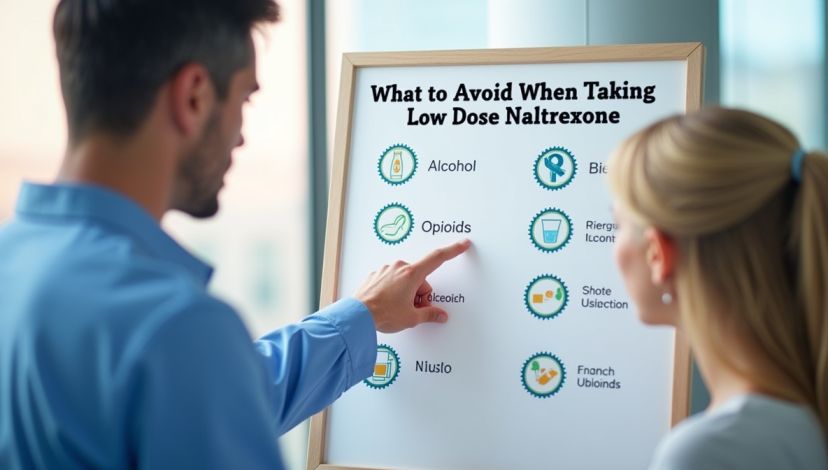Low-dose naltrexone (LDN) is a drug that is growing in popularity as a therapy agent in the treatment of diverse health disorders, including autoimmune disorders, chronic pains, and multiple sclerosis. Its mechanism of action involves modulation of the immune system and low-dose opioid receptor blocking, usually at a dose of 4.5 mg daily. Despite being rather well-tolerated, knowing what to avoid when taking low dose naltrexone is essential because there are a number of substances and behaviors that should be excluded to avoid any severe side effects or treatment failure. Understanding these precautions is a key to maximally utilize the benefit of LDN and staying safe.
Key Points:
- Consumption of opioids should be avoided to avoid severe withdrawal and life-threatening interactions.
- Avoid alcohol so that the chances of damaging the liver or making poor decisions can be minimized.
- Before any harmful drug reactions, make sure that your doctor knows all the drugs and supplements you currently take.
What are the Reasons Why Opioids are Not Good to Use During the Low Dose Naltrexone?
The mechanisms of opioids and LDN on the body receptors are anti-opioid. Naltrexone binds to these receptors, canceling the effects of opioids and thus they do not cause their normal effect. The use of opioids on LDN has been known to bring about the sudden and intense withdrawal effects of the opioid symptoms, which include vomiting, nausea, diarrhea, anxiety, sweating, and muscle pains. Severely, it can be life-threatening or need hospitalization.
Like, in case of morphine or oxycodone ingested by a person on LDN, the effect of the opioid will be blocked, but sudden withdrawal symptoms might take place. It is referred to as precipitated withdrawal. To prevent this, it is necessary that the patients cease opioid use at least 7 to 14 days before commencing LDN, based on half suspected. This is what makes it safe because the body will have time to eliminate opioids to avoid any risky interactions.
| Opioids to Avoid While Taking LDN | Examples |
|---|---|
| Prescription opioids | Morphine, oxycodone, hydrocodone |
| Illicit opioids | Heroin |
| Opioid-containing cough medicines | Codeine-containing syrups |
| Certain anti-diarrheal medications | Loperamide (Imodium) |
Warning: -Off the grid medicine or cough syrups, or anti-diarrheal medications may have opioids in them; use caution and check with your medical professional.
What is the effect of alcohol on low-dose naltrexone?
Alcohol also can be avoided or minimized in the use of LDN. Naltrexone inhibits the effects of the pleasing and pleasurable effects of alcohol use, and thus decreases alcoholic cravings, but not the impairing effects of alcohol on the coordination, judgment, and reaction time. That does not mean that you are safe when you have not had the typical state of being intoxicated, the so-called buzz.
In addition, LDN with alcohol enhances a threat to the liver damage. Because these two substances can put stress on the liver, consuming copious amounts of alcohol when on LDN may result in liver inflammation or aggravation of pre-existing liver upsets. Chronic alcohol consumption during treatment of LDN can also lead to memory issues, depression, and anxiety.
| Effects of Alcohol Alone | Effects of Alcohol + LDN |
|---|---|
| Causes intoxication and euphoria | Blocks euphoria but causes impairment |
| Can damage the liver over time | Increased risk of liver damage |
| Impairs coordination and judgment | Still causes slowed reflexes and poor judgment |
Note: Do not take alcohol, particularly when you have a problem with the liver, or in case you are under some other drugs that influence the liver.
Which Other Drugs Should Be Avoided: What To Avoid When Taking Low Dose Naltrexone?
Along with opioids and alcohol, some drugs may have an adverse effect when combined with LDN. An illustration is that depressants to the central nervous system (CNS), like sedatives, tranquilizers, and in particular benzodiazepines, need to be avoided or treated with some limitations. These medications have the potential to augment the chances of side effects such as dizziness, tiredness, and overdose.
On top of that, there are those drugs which can counteract with naltrexone, such as disulfiram (Antabuse) and thioridazine. Report to the doctor all of your prescription medicines, over-the-counter medications, and supplements, and herbal products so that you do not have dangerous effects with your drug interactions.
| Medication Type | Reasons to Avoid LDN |
|---|---|
| CNS depressants (benzodiazepines, sedatives) | Increased risk of sedation and overdose |
| Disulfiram (Antabuse) | Potential adverse drug interactions |
| Thioridazine | Risk of side effects and toxicity |
What Are The Risks And What To Avoid When Taking Low Dose Naltrexone Incorrectly?
It is crucial to follow the recommended dosage of LDN to the latter. The treatment may be inefficient and unsafe due to the missed doses or additional doses. Failure to take the medication dose might decrease the blocking effects of the drug against opioid receptors, posing the threat of opioid sensitivity and risk of overdose when opioid is used thereafter.
In case a dose is skipped, do it when remembered, but do not take it approaching a period of the next dose. There is no need to use a higher dosage to make up for, by doubling doses. Moreover, the cessation of LDN abruptly should be avoided without consulting a physician because this may deprive individuals of the benefits of treatment and adversely affect their health.
Patients are advised to carry an identification card which states that they are under LDN so that, in the event of a crisis, healthcare providers can attend to them in the correct manner. This is particularly in the event that there is a necessity of using opioid pain killers or anesthesia, since LDN can cause a conflict with treatments that use opioid therapies.
How Can You Ensure Safe And Effective Use While Knowing What To Avoid When Taking Low Dose Naltrexone?
The following precautions can be adhered to so as to take the maximum out of LDN and prevent its complications:
- Always follow all prescriptions of the healthcare provider in using LDN.
- Fortunately, opioids and alcohol should be avoided throughout the treatment process.
- Tell your doctor everything that you take.
- Instant reporting of any abnormal side effects and symptoms.
- The patient will have regular follow-ups to check how they respond and change the dosage where necessary.
- Keep your LDN identification card in your pocket in case of emergency.
| Safety Tips for LDN Use | Explanation |
|---|---|
| Follow the prescription strictly | Prevents overdose and side effects |
| Avoid opioids and alcohol | Avoids withdrawal and liver damage |
| Communicate with the healthcare provider | Ensures safe medication combinations |
Conclusion
Low-dose naltrexone effectively treats many chronic diseases but requires careful management to avoid serious risks. It is also necessary to avoid taking opioids, alcohol, and some medicines to exclude the risk of life-threatening interactions and side effects. By following the advice of your doctor and keeping the lines of communication with healthcare providers open, you should be able to make sure that the treatment you will receive will be not only safe but also effective. You should always be cautious of your intake and express any doubts as soon as possible to achieve the best outcomes of the LDN therapy.
Attention: Do not start or stop taking LDN without talking to your medical practitioner.
FAQ’s
Q1: Would I be allowed any painkillers when taking low-dose naltrexone?
A1: Do not take opioid painkillers at all; non-opioid painkillers, such as acetaminophen or ibuprofen, are safer, although make sure to consult your doctor.
Q2: What is the required time between that opioids are stopped and LDN is begun?
A2: It would be 7 days on short-acting opioids and 10 to 14 days on long-acting opioids, and start LDN.
Q3 Can one consume small amounts of alcohol when using LDN?
A3: One should watch out on the consumption of alcohol as much as possible, of course, to avoid tissue damage in the liver, which causes poor decisions and judgment.
Q4: What happens in case I miss a low-dose naltrexone dose?
A4: If you forget a dose, take it as soon as possible unless it is near to the next dose; do not take an extra dose.
Q5: Will LDN induce withdrawal in case I am using opioids in the recent past?
A5: Yes, intake of LDN too early after opioids may lead to serious withdrawal effects; hence, it is necessary to give an adequate clearance.




